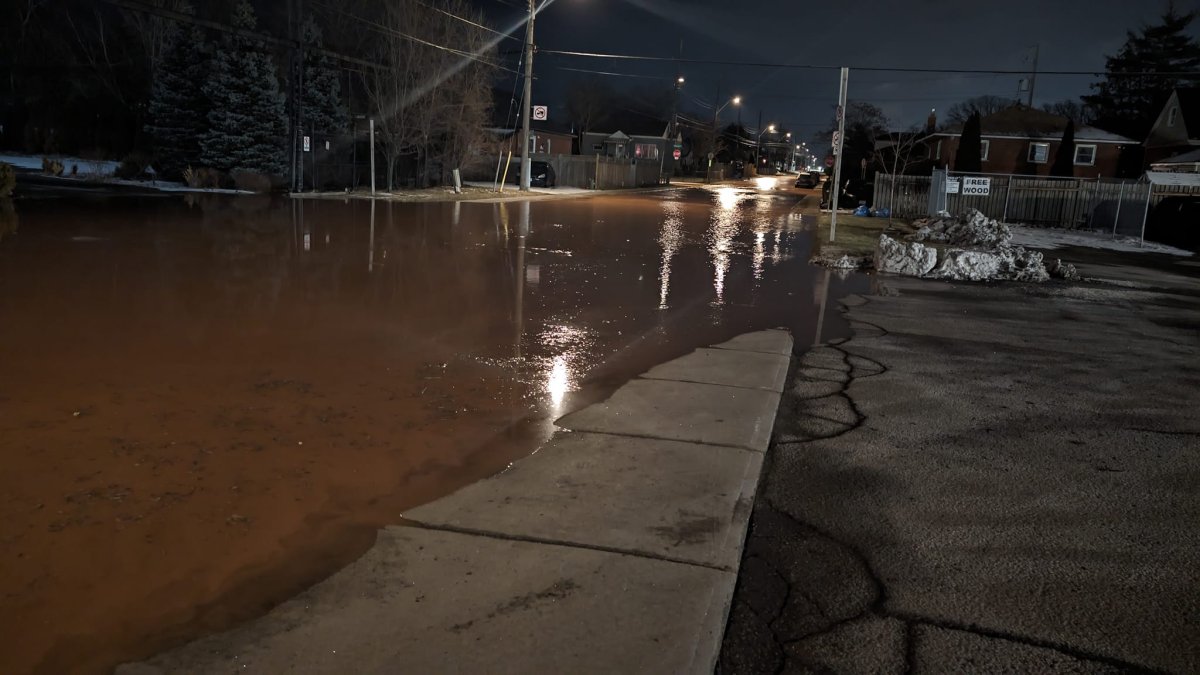A break in a 140-year-old water main in east Hamilton, Ont. Friday morning raised concerns about aging infrastructure, but the municipal director of water and wastewater says the city has had fewer breaks in 2023 than it did the year before.

Shayne McCauley said the city spent some $1.45 million on fixing 188 breaks in 2023, less than the reported $2.3 million spent on 277 detected issues in 2022.
“We’ve seen a couple less than we did last year at the same time, but that doesn’t necessarily mean it’s going to continue on through the rest of this winter season,” McCauley said.
The city has seen four breaks over the past 48 hours, one in the city centre, another in the east end and a pair in Ancaster.
A flood at the intersection of Knox Avenue and Mead Avenue early Friday was the result of a rupture attributed to ground movement resulting from cold temperatures.
A photo of flooding near Mead and Glow Avenues early on Jan. 19, 2024 after a water main break.
The break was fairly large since the pipe affected flows from the nearby Woodward Water Treatment plant carries water to the rest of the city.
McCauley said nearby residents appeared to be “resilient and extremely patient” during the repairs, adding that city crew salted the area to reduce the risk of people slipping on ice.
Meanwhile, a broken valve at Main and Bay will take some five days to fix due to the need to cure cement in frigid temperatures.
McCauley said the two breaks show how repair work can take different amounts of time to complete. Factors can include the type of repair, the size and location of the job, and the weather conditions.
“Some pipes we’re able to structurally rehabilitate, like put a liner in them which restores the strength and full functionality of the pipe,” McCauley said. “Others have to be dug up and segments of pipe replaced.”
Both incidents make cases for the uptick in water and sewer infrastructure spending, which is expected to be 10 per cent more in 2024, leading to an $88 per year bump on the average residential water bill.
Mayor Andrea Horwath characterized that water rate increase as a “good signal” of more difficult discussions in attempts to lower a projected 7.9 per cent property tax increase for taxpayers in 2024.
In November, Mike Zegarac, Hamilton’s general manager of finance and corporate services, said it could have been worse as original projections suggested a 20 per cent water-rate increase. That was eventually mitigated through savings and project deferrals.
“We identified approximately $46 million in capital savings that reduced the funding necessary for infrastructure for 2024,” Zegarac explained.
“We also deferred some capital projects, infrastructure projects at about $85 million because those projects weren’t ready to go.”
During city hall discussions, Ward 10 Councillor Jeff Beattie told Global News the city “hasn’t really kept up” with some capital needs to the system.
Amid Ontario’s Environment Ministry (MECP) order requiring the city to undertake an audit of its sewage infrastructure as of late 2022, Beattie said money will simply have to be spent fixing a system that has been the victim of low construction standards over several decades.
“We have to make sure we’re not continually just dumping things into Lake Ontario,” he said.
“We have to be more modern in our approach, and that’s going to require investment, unfortunately.”
The city’s water division estimates they’ll need somewhere in the neighbourhood of $285 million over the next ten years to replace or rehabilitate water mains.



Comments